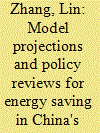| Srl | Item |
| 1 |
ID:
112303


|
|
|
|
|
| Publication |
2012.
|
| Summary/Abstract |
Designing measures for the reduction of energy consumption in urban areas is a complex venture indeed. In terms of urban sustainability, such measures affect energy efficiency as well as environmental, economic and social aspects. Numerous publications dealt with such methodological approaches in the past, whilst the subject of sustainable urban areas and cities is constantly gaining interest. Furthermore, energy performance depends on building density, occupancy and consumer profile, climatic conditions, not least construction quality, factors linked, directly or not, to socioeconomic aspects. Greek cities are known for their density, their polymorphic structure and their complexity. Thus, planning energy conservation measures is a difficult task, demanding a precise methodological approach, which will embody most of these aspects to a great extent. This paper proposes a methodology on how to manage Greek cities in terms of their energy efficiency, emphasizing on the residential stock.
|
|
|
|
|
|
|
|
|
|
|
|
|
|
|
|
| 2 |
ID:
125418


|
|
|
|
|
| Publication |
2013.
|
| Summary/Abstract |
Energy efficiency of buildings in the service sector is becoming increasingly important in China due to the structural shift of the economy from industry to services. This paper employs a bottom-up cohort model to simulate current energy saving policies and to make projections for future energy use and CO2 emissions for the period 2000-2030 in the Chinese service sector. The analysis shows that energy demand in the service sector will approximately triple in 2030, far beyond the target of quadrupling GDP while only doubling energy use. However, it is feasible to achieve the target of emission reduction by 40% in 2020 even under the poor state of compliance rate of building standard. This paper also highlights four crucial aspects of designing optimal energy saving policies for China's service sector based on the model results.
|
|
|
|
|
|
|
|
|
|
|
|
|
|
|
|